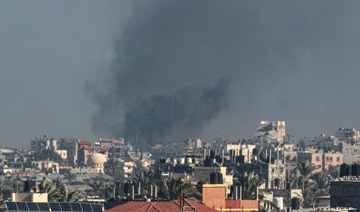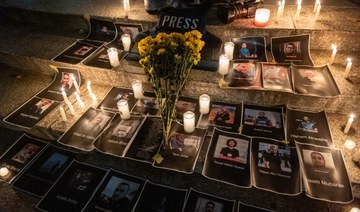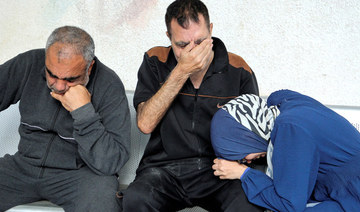ASHKELON, Israel: Effi Hajjaj has reopened his seafront stall in south Israel’s Ashkelon, offering coffee and snacks to beach-goers who are back in what he called a “victory” after almost 100 days of war.
Were it not for the sound of explosions from the besieged Gaza Strip, about 10 kilometers (six miles) down the coast, it may have appeared as a perfectly quiet day on the sandy beach.
“Victory means a return to routine, and a certain routine has returned,” said 55-year-old Hajjaj, whose business like many others had been shut after Hamas’s October 7 attack.
But behind the scene of normality, the trauma of the attack — the worst in Israel’s 75-year history — still looms large.
Palestinian militants stormed southern Israel and under a barrage of rockets, resulting in about 1,140 deaths, mostly civilians, according to an AFP tally based on official figures.
In response, Israel has vowed to eradicate Hamas, labelled a “terrorist” organization by the United States and the European Union.
A relentless Israeli military campaign has killed more than 23,700 people, mostly women and children, according to the health ministry in Hamas-ruled Gaza.
With fighting now mainly restricted to the narrow Palestinian territory, Israelis are for the most part protected from the violence but fear for captives held across the border and troops inside Gaza.
Around 250 hostages were seized on October 7, 132 of whom Israel says remain in Gaza.
“We have to keep going, move forward... but wherever we go, the conversations revolve around the hostages, around the things we’ve been through,” said Marina Michaeli, a 54-year-old real estate agent in Ashkelon.
“We’ve lost our joy,” she said.
Support for the war remains high among Israel’s Jewish majority, recent public opinion polls suggest.
In December, a Israel Democracy Institute survey found that 75 percent of Jewish Israelis were opposed to calls — including from close ally the United States — to reduce the intensity of bombing in populated areas.
And 80 percent felt that the suffering of Palestinian civilians should be given “little” or “very little” consideration in the context of the war, the poll said.
As soon as schools and shops reopened, many Ashkelon residents went on with their everyday lives.
And on the seafront, “people are going out again,” Hajjaj said.
On October 7, Palestinian militants reached the outskirts of the city.
But now, Hajjaj said, “there are hardly any rockets and they are no longer afraid of terrorist attacks.”
Most rockets fired from Gaza are intercepted by Israel’s Iron Dome air defense system.
Still, the hospital in Ashkelon has treated some 1,260 people for injuries related to the October 7 attacks or from rockets, according to a hospital spokeswoman.
Closer to Gaza as well as in areas along the Lebanese border, some 200,000 Israelis have been unable to return to their homes since the violence erupted.
The Israeli military has also called up 360,000 reservists in more than three months of war.
The army says at least 186 soldiers have been killed inside Gaza since the ground offensive began in late October.
Concern for soldiers, hostages and displaced Israelis means “we can’t talk about a return to normality,” said Denis Charbit, a political scientist at Israel’s Open University.
But he argued “Israeli resilience” is “the best revenge: to be deeply shaken, but to triumph with this incredible momentum and will to live.”
The stories of fallen soldiers and interviews with their families are all over TV and radio broadcasts, and posters of the hostages seem to cover every street corner.
Some are stamped with the word “Home” for those released, most of them during a one-week truce that began in November.
Others offer condolences: “May their memory be a blessing.”
While the “Bring them home now” campaign to free the remaining hostages keeps getting louder, there are also some signs of a return to pre-war life in Israel, a country of just over nine million.
Political controversies that had been put aside, most notably around the hard-right government’s judicial overhaul that last year divided the nation, have begun to reemerge.
And in early January, Israel announced it was sending several thousand reservists home in a bid to help boost the economy.
To support consumption, the Bank of Israel lowered interest rates for the first time since April 2022.
In Jerusalem, large crowds have returned to the city’s central Mahane Yehuda market, particularly at the start of the weekend.
“It’s wonderful to see people coming to shop... when everything used to be empty,” said Hanna Gabbay, 22.
“The country is still traumatized,” she said. “But life is stronger than anything, we have to keep going.”
In Israel’s north, a strip of land several kilometers along on the border with Lebanon has been evacuated due to clashes with Hamas-allied Hezbollah militants and fears of attacks on civilians.
In the south, the border with the Gaza Strip largely remains a no-go zone.
Most of Sderot’s 35,000 inhabitants have yet to return to their town just two kilometers from Gaza, where militants on October 7 killed at least 40 people.
Cats roam around a small square where a few shops have reopened but are struggling for customers. Only birdsong and the occasional passing car break the silence.
“We don’t feel safe,” said resident Eti Buhbut, 46.
“But we only have one country, and nowhere else to go.”
Israelis cautiously embrace ‘routine’ as Gaza war nears 100 days
https://arab.news/9e5cf
Israelis cautiously embrace ‘routine’ as Gaza war nears 100 days

- A relentless Israeli military campaign has killed more than 23,700 people
- With fighting now mainly restricted to the narrow Palestinian territory, Israelis are for the most part protected from the violence
Biden speaks with Netanyahu as Israelis appear closer to Rafah offensive

The NSC spokesperson said Biden reiterated US concerns about an invasion of Rafah — where more than 1 million civilians from other parts of Gaza are sheltering after 7 months of war sparked by Hamas’ Oct. 7 attack on Israel — and said he believes reaching a ceasefire with Hamas is the best way to protect the lives of Israeli hostages held in Gaza. The officials spoke on the condition of anonymity to discuss the call before an official White House statement was released.
The call comes hours before Biden is to host King Abdullah II of Jordan for a private lunch meeting at the White House on Monday.
On Sunday, Netanyahu rejected international pressure to halt the war in Gaza in a fiery speech marking the country’s annual Holocaust memorial day, declaring: “If Israel is forced to stand alone, Israel will stand alone.”
“I say to the leaders of the world: No amount of pressure, no decision by any international forum will stop Israel from defending itself,” he said, speaking in English. “Never again is now.”
UN experts condemn Israel’s ‘sexual assault and violence’ in Gaza

- Statement pointed to “continued reports of sexual assault and violence against women and girls, including against those detained by Israeli occupation forces”
GENEVA: United Nations experts on Monday condemned “unacceptable” violence by the Israeli military against women and children during the ongoing war in Gaza, particularly sexual violence and enforced disappearances.
“We are appalled that women are being targeted by Israel with such vicious, indiscriminate and disproportionate attacks, seemingly sparing no means to destroy their lives and deny them their fundamental human rights,” the seven special rapporteurs said in a statement.
Special rapporteurs are independent experts appointed by the UN Human Rights Council. They do not speak on behalf of the United Nations.
The statement pointed to “continued reports of sexual assault and violence against women and girls, including against those detained by Israeli occupation forces.”
They cited UN reports saying women and girls in Gaza were victims of enforced disappearances.
Referring to Hamas, which runs the besieged Palestinian territory, Israel’s mission in Geneva alleged the experts had “once again chosen to ignore Hamas’s systematic militarization of health facilities and civilian infrastructures in the Gaza Strip, voluntarily and actively using the population as human shields.”
“In issuing such a statement, the signatories try to create an alternative narrative, parroting the agenda of a terrorist organization that is actively destroying the lives of the Palestinian population in Gaza,” the Israeli mission said.
The bloodiest-ever Gaza war started after an unprecedented attack on southern Israel by militants from Hamas on October 7.
The attack resulted in the deaths of 1,170 people, mostly civilians, according to an AFP tally of Israeli official figures.
Israel’s relentless retaliatory military offensive has killed more than 34,700 people in Gaza — most of them women and children — according to Gaza’s health ministry.
The UN experts said Israel’s widespread destruction of housing in Gaza and the fact that Palestinians were having to live in “precarious” conditions in makeshift tents had a disproportionate impact on women and girls, particularly on their personal security and privacy.
“The treatment of pregnant and lactating women continues to be appalling, with the direct bombardment of hospitals and deliberate denial of access to health care facilities by Israeli snipers,” they added.
More than 180 women per day were giving birth without pain relief, while hundreds of babies have died due to a lack of electricity for incubators, they said.
These conditions have led to a surge in miscarriages, the experts said.
They said Israeli forces had “destroyed Gaza’s largest fertility clinic,” which stored embryos, and estimated that 690,000 women and girls in Gaza were deprived of menstrual hygiene products.
The Israeli mission in Geneva said Israel “categorically rejects unsubstantiated allegations of sexual assaults and violence.”
It said Israel was ready to investigate “any concrete claims of misconduct by its security forces when presented with credible allegations and evidence.”
The UN experts said “the government of Israel has continuously failed to conduct an independent, impartial and effective investigation into the reported crimes.”
‘Where can we go?’ say Rafah residents as Israel demands evacuation
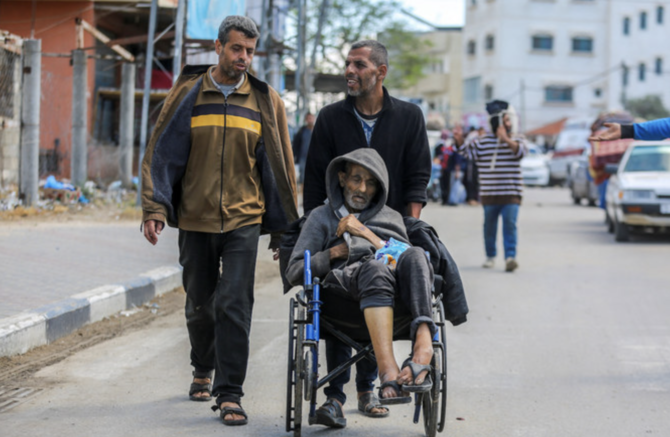
- Areas designated for evacuation currently shelter some 250,000 people
- Israel’s retaliatory offensive, aimed at destroying Hamas, has killed at least 34,683 people in Gaza, mostly women and children
Rafah: Palestinian civilians in the southern Gazan city of Rafah voiced despair on Monday as Israel dropped fliers urging them to evacuate for their own “safety” ahead of a “limited” military operation.
Israel’s army said it was instructing Palestinian families in eastern Rafah to flee in preparation for an expected ground assault on the city which abuts Gaza’s border with Egypt.
Residents of Rafah described emerging outside after a terrifying night in which around a dozen air strikes were carried out on Rafah, to find fliers falling from the sky telling them to “evacuate immediately.”
“The army is working with intensive power against the terrorist forces near you,” read a flier circulated in eastern Rafah.
“For your safety, the IDF (Israeli military) tells you to evacuate immediately toward the expanded humanitarian zone of Al-Mawasi,” it said, with a map indicating the location to the north of Rafah.
Osama Al-Kahlout, of the Palestinian Red Crescent Society in Gaza, told AFP that the areas designated for evacuation currently shelter some 250,000 people, many of whom have already been displaced from other areas in the Gaza Strip.
“The evacuation process has begun on the ground, but in a limited manner,” he said.
An Israeli militark spokesman, when asked how many people should move, said: “The estimate is around 100,000 people.”
About 1.2 million people are currently sheltering in Rafah, according to the World Health Organization, most having fled there during the seven-month war between Israel and Hamas Palestinian militants.
Amid pouring rain, some of those sheltering in Rafah said they had begun packing up their things from the densely packed tents and preparing to leave even before Israel’s directive arrived.
“Whatever happens, my tent is ready,” a resident told AFP.
But others said the area they were being told to flee to was already overcrowded, and they did not trust that it would be safe.
Abdul Rahman Abu Jazar, 36, said he and 12 family members were in the designated evacuation area.
Jazar and his family did not know what to do, he said, because the “humanitarian zone” they were told to head for “does not have enough room for us to make tents because they are (already) full of displaced people.”
“Where can we go? We do not know,” he told AFP.
“There are also no hospitals and it is far from any services many need,” he said, adding that one of his family members relied on dialysis at the Al-Najar hospital, in the area of Rafah instructed to evacuate.
“How will we deal with her after that? Should we watch her die without being able to do anything?“
An Israeli military spokesman told reporters that the evacuation “is part of our plans to dismantle Hamas ... we had a violent reminder of their presence and their operational abilities in Rafah yesterday.”
On Sunday, four Israeli soldiers were killed and others wounded, the army said, when a barrage of rockets was fired toward the Kerem Shalom border crossing between Israel and Gaza.
The army said the rockets were fired from an area adjacent to Rafah.
International aid organizations have voiced alarm at the expected invasion of Rafah.
“From the humanitarian perspective, no credible humanitarian plan for an attack on Rafah exists,” said Bushra Khalidi, advocacy director for Oxfam in the Palestinian territories.
She said she could “not fathom that Rafah will happen,” asking where displaced Palestinians will go “when most of their surroundings have been reduced to death and rubble?“
Gaza’s bloodiest-ever war broke out following Hamas’s unprecedented October 7 attack on Israel which resulted in the deaths of more than 1,170 people, mostly civilians, according to an AFP tally of Israeli official figures.
Militants also seized some 250 hostages, with Israel estimating that 128 of them remain in Gaza, including 35 whom the military says are dead.
Israel’s retaliatory offensive, aimed at destroying Hamas, has killed at least 34,683 people in Gaza, mostly women and children, according to the Hamas-run territory’s health ministry.
US weapon system identified in Israeli-Lebanon strike may breach international law

- Guardian investigation with Human Rights Watch identifies Boeing-made Joint Direction Attack Munition fragments at site where aid workers were killed
- US bans export of such systems to foreign militaries where ‘credible information’ of human rights breaches exists
LONDON: An Israeli airstrike in Lebanon that killed seven aid workers in March may have been conducted with a US-supplied weapon system, according to an investigation by The Guardian.
The incident claimed the lives of seven paramedics aged 18-25, all volunteers, at an ambulance center in Al-Habariyeh in southern Lebanon on March 27.
It came five days before an Israeli strike in Gaza killed seven aid workers working for World Central Kitchen.
Debris found at the scene in Al-Habariyeh was identified by The Guardian, an independent expert and Human Rights Watch as having belonged to a 500-pound Israeli MPR bomb and a Boeing-made Joint Direction Attack Munition, a system attached to explosives to turn them from “dumb bombs” into GPS-guided weapons.
HRW’s Lebanon researcher Ramzi Kaiss told The Guardian: “Israel’s assurances that it is using US weapons lawfully are not credible. As Israel’s conduct in Gaza and Lebanon continues to violate international law, the Biden administration should immediately suspend arms sales to Israel.”
The US government is legally unable to help or arm foreign militaries where “credible information” of human rights abuses exists, under the terms of the 1997 Leahy law.
A spokesperson for the US National Security Council told The Guardian: “The US is constantly working to ensure defense articles provided by the US are being used consistent with applicable domestic and international law. If findings show violations, we take action.”
But Josh Paul, a non-resident fellow with Democracy for the Arab World Now and a former State Department employee, said: “The State Department has approved several of these (weapons) transfers on a 48-hour turnaround. There is no policy concern on any munitions to Israel other than white phosphorus and cluster bombs.”
He added that JDAMs have been “key items” regularly requested by Israel since the start of the Gaza war.
Secretary of State Antony Blinken will deliver a report on Wednesday to Congress on Israel’s use of American weapons and whether they may have been involved in violations of this or other laws.
Maryland Sen. Chris Van Hollen told The Guardian that the findings from Al-Habariyeh are “deeply concerning and must be fully investigated by the Biden administration, and their findings should certainly be included in the NSM-20 report that is due to be submitted to the Congress on May 8.”
The airstrike on the ambulance center in Al-Habariyeh came without warning before 1 a.m. on March 27. No fighting had been reported in the area.
The victims had been at the center for the night shift, and were named as twin brothers Hussein and Ahmad Al-Shaar, aged 18; Abdulrahman Al-Shaar, 19; Mohammad Hamoud, 21; Mohammad Al-Farouk Aatwi, 23; Abdullah Aatwi, 24; and Baraa Abu Kaiss, 24.
The Israeli military claimed that the strike, which leveled the two-storey building, killed a “prominent terrorist belonging to Jamaa Islamiya,” an armed Lebanese political group with ties to Hezbollah. It did not identify the person by name.
A Jamaa Islamiya spokesman acknowledged that some of the ambulance volunteers were members of the group, but denied that they were part of its armed wing.
Samer Hardan, head of the local Civil Defense center who was among the first responders, told The Guardian: “We examined every centimetre looking for parts of bodies and their possessions. We saw nothing military-related. We knew (the victims) personally, so we could identify their remains.”
Since Oct. 7, 16 medical workers have been killed by Israeli airstrikes in Lebanon, and a further 380 people have died including 72 civilians. Eleven Israeli soldiers and eight civilians have also been killed.
Kassem Al-Shaar, father of Ahmad and Hussein, said he had warned his sons not to volunteer.
“I told them that it was dangerous to do this type of work, but they said that they accepted the risk. I don’t know what Israel was thinking — these were young people excited to help others,” he said.
“My sons wanted to do humanitarian work, and look what happened to them. Israel wouldn’t dare to do what they did if it wasn’t for the US standing behind them.”
Aid groups issue urgent appeal for Yemen funds
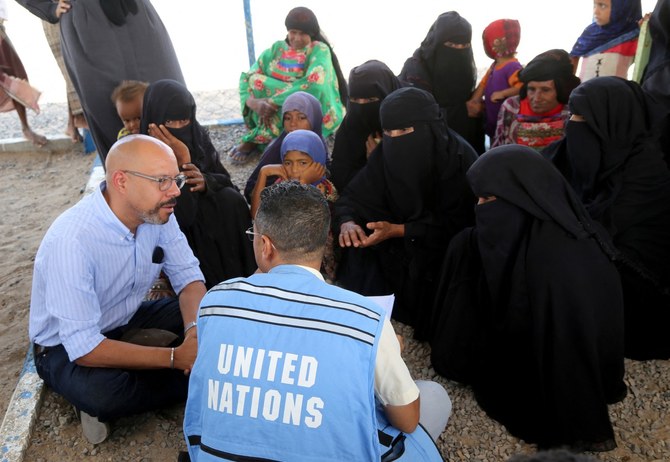
- UN agencies warned that 18.2 million people in need of help after nine years of war
Dubai: Nearly 200 aid groups appealed on Monday for funds to bridge a $2.3 billion shortfall in assistance for war-torn Yemen, warning of potentially “catastrophic consequences” for the Arabian Peninsula’s poorest country.
A joint statement from 188 humanitarian organizations, including several UN agencies, warned that 18.2 million people — more than half the population — were in need of help after nine years of war.
Their appeal came a day before a meeting of high-ranking EU officials in Brussels to discuss the aid program for Yemen, which is suffering one of the world’s worst humanitarian crises.
“Inaction would have catastrophic consequences for the lives of Yemeni women, children and men,” the statement said, calling Tuesday’s meeting a “critical moment.”
“The humanitarian community appeals to donors to urgently address existing funding gaps, and provide sustainable support to enhance resilience and reduce aid dependency.”
Yemen has been gripped by conflict since the Iran-backed Houthis overran the capital Sanaa in 2014, triggering the Saudi-led military intervention in support of the government the following year.
Hundreds of thousands have died in the fighting or from indirect causes such as a lack of food, the United Nations says.
Hostilities slowed considerably in April 2022, when a six-month, UN-brokered ceasefire came into effect, and they have remained at a low level since.
But only $435 million of the $2.7 billion called for in Yemen’s 2024 Humanitarian Response Plan requirement has been raised, the aid groups said, warning of threats including food insecurity, cholera and unexploded ordnance.
“Underfunding poses a challenge to the continuity of humanitarian programming, causing delays, reductions and suspensions of lifesaving assistance programs,” it said.
“These challenges directly affect the lives of millions who depend on humanitarian assistance and protection services for survival.”



